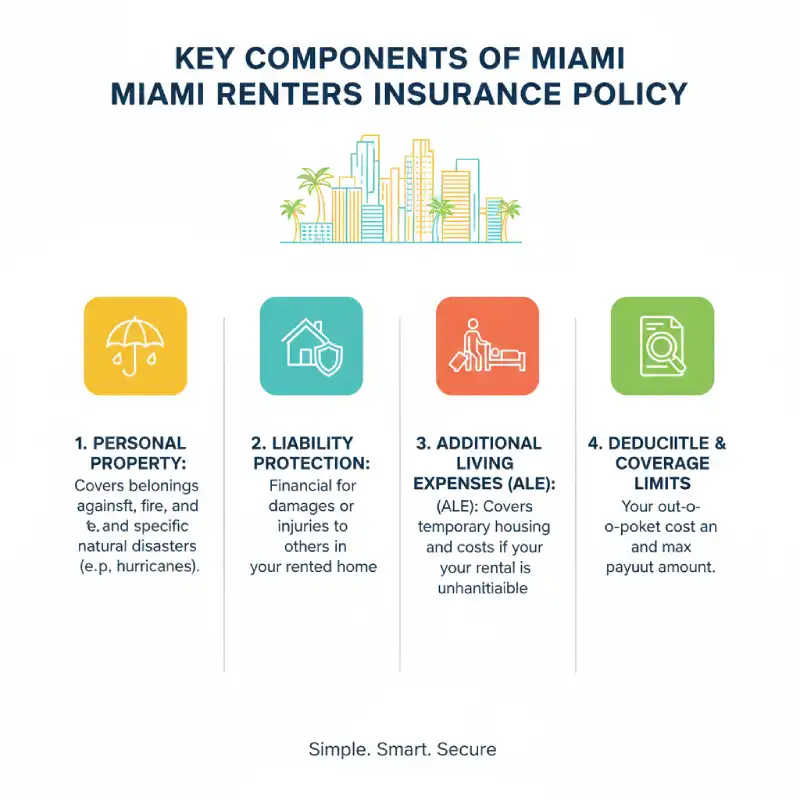Miami Renters Insurance: Average Costs Uncovered

When considering renters insurance in Miami, it’s immediately apparent that costs can differ significantly from state and national averages. This difference is largely due to Miami’s unique geographical location, population density, and specific risk factors.
Contents
Miami vs. State and National Averages
The average cost of renters insurance in Miami stands at approximately $231 per year, which translates to about $19 per month. For those residing in a 2-bedroom apartment, the monthly cost typically ranges from $25 to $35. These figures are higher than what many renters pay across Florida and the nation.
To put this into perspective, the average cost of renters insurance across the entire state of Florida is around $152 per year, or about $13 per month, according to NerdWallet’s analysis. Other sources, such as Insure.com, place Florida’s average slightly higher at $248 per year ($21 per month), while MoneyGeek reports an average of $229 annually for the state. This variation highlights the importance of comparing multiple sources, but consistently, Miami trends higher.
Nationally, the average cost for renters insurance is even lower, often cited around $148 per year ($12 per month) by NerdWallet, or $215 per year ($18 per month) by TrustedChoice.com, for a policy with standard coverage limits.
The disparity between Miami’s rates and the broader state and national averages underscores the impact of regional risk factors. Miami’s vulnerability to hurricanes, its coastal location, and other local dynamics contribute to these lift premiums. We’ll dig deeper into these influencing factors shortly.

What Factors Influence Renters Rates?
Several elements combine to determine the cost of renters insurance in Miami. These can broadly be categorized into location-specific risks, your chosen policy options, and your personal profile. Understanding these factors can help us steer the insurance landscape more effectively.
Location-Specific Risks
Miami’s geographic position makes it particularly susceptible to certain natural disasters, which directly impact insurance premiums.
- Hurricane Exposure: Florida is highly prone to hurricanes and tropical storms, and Miami-Dade County is often in the direct path. The potential for widespread damage from high winds and heavy rainfall means insurers face higher risks, which are reflected in the cost of coverage. In 2019, USA Today reported that Miami had nearly 800,000 properties at risk from storm surge flooding, highlighting the significant exposure to such perils.
- Flood Zones: While standard renters insurance typically excludes flood damage, living in a flood-prone area can still affect premiums for other perils, and it certainly necessitates considering a separate flood insurance policy.
- Neighborhood Crime Rates: Like any major metropolitan area, crime rates vary by neighborhood in Miami. Areas with higher rates of theft or vandalism may see slightly liftd renters insurance premiums due to the increased risk of personal property claims.
- ZIP Code Variations: Insurance rates can fluctuate significantly even within Miami, based on specific ZIP codes. Factors such as proximity to emergency services, local crime statistics, and construction types can cause premiums to differ from one neighborhood to another. For instance, while Miami averages $231 per year, some ZIP codes might be higher or lower depending on these localized risks.
Your Policy Choices
The decisions we make about our coverage directly influence the premium.
- Coverage Limits: This refers to the maximum amount an insurer will pay for a covered loss. Higher limits for personal property (e.g., $50,000 vs. $20,000) or liability (e.g., $300,000 vs. $100,000) will naturally lead to higher premiums. It’s crucial to accurately assess the value of your belongings to ensure adequate protection.
- Deductible Amount: The deductible is the amount we pay out of pocket before our insurance coverage kicks in. Choosing a higher deductible (e.g., $1,000 instead of $500) can lower our monthly or annual premium, but it means we’ll pay more upfront if we need to file a claim.
- Replacement Cost vs. Actual Cash Value: When insuring personal property, we typically have two options. Actual Cash Value (ACV) pays for the depreciated value of items, while Replacement Cost Value (RCV) pays to replace items with new ones of similar quality. RCV policies generally cost more but offer more comprehensive protection.
- Policy Riders/Endorsements: For high-value items like expensive jewelry, art, or electronics, standard personal property limits might not be enough. Adding specific riders or endorsements to cover these items will increase the premium but ensures they are fully protected.
Your Personal Profile
Our individual circumstances also play a role in determining renters insurance costs.
- Credit Score: In many states, including Florida, insurers use credit-based insurance scores to help predict the likelihood of future claims. A higher credit score can often lead to lower premiums, while a lower score might result in higher rates. Renters with poor credit may pay around 65% more than those with good credit, according to NerdWallet.
- Claims History: A history of previous insurance claims, whether for renters or other types of insurance, can signal a higher risk to insurers, potentially leading to increased premiums. Maintaining a claims-free record can help keep costs down.
- Home Security Systems & Fire Alarms: Installing approved security devices like burglar alarms, smoke detectors, and sprinkler systems can often qualify us for discounts, as they reduce the risk of theft and fire damage.
- Pet Ownership: Certain dog breeds, deemed higher risk by insurers due to potential liability claims (e.g., bites), can sometimes affect liability premiums or even make it harder to find coverage with some companies.
Decoding Your Miami Renters Insurance Policy
Understanding what a renters insurance policy covers—and what it doesn’t—is vital, especially in a unique environment like Miami. A standard policy provides a foundational layer of protection, but specific local perils often require careful consideration.
Standard Coverage Components
A typical renters insurance policy in Miami, like elsewhere, usually includes four main types of coverage:
- Personal Property: This covers our belongings—furniture, electronics, clothing, and other personal items—against specified perils such as fire, theft, vandalism, and wind damage. It protects our possessions whether they are in our rental unit, in storage, or even temporarily with us outside the home. It’s crucial to create a detailed home inventory to accurately determine the amount of personal property coverage needed.
- Liability Protection: This is a cornerstone of renters insurance. If someone is injured in our rental unit or if we accidentally cause damage to someone else’s property, liability coverage can help pay for their medical expenses, legal fees, and any resulting judgments against us. This is particularly important for peace of mind in a busy city like Miami.
- Additional Living Expenses (Loss of Use): If our rental unit becomes uninhabitable due to a covered peril (like a fire or severe storm), this coverage helps pay for temporary housing, food, and other essential living expenses while repairs are being made. This can be a lifesaver in the aftermath of a major event.
- Medical Payments: This offers a small amount of coverage for medical expenses if a guest is accidentally injured on our property, regardless of who is at fault. It’s designed to cover minor injuries and can help prevent a larger liability claim.
Essential Coverage for Miami’s Unique Perils
Given Miami’s specific risks, certain aspects of coverage warrant extra attention:
- Hurricane Wind Damage: Standard renters insurance policies generally cover damage to personal property caused by wind from hurricanes. However, it’s important to understand any specific deductibles that apply to hurricane-related claims. Florida often has a separate “hurricane deductible,” which is typically a percentage (e.g., 2%, 5%) of our personal property coverage amount, rather than a flat dollar amount.
- Wind Mitigation Credits: While more common for homeowners, some renters may benefit if their building has wind-resistant features. Landlords who have invested in wind mitigation measures (like impact-resistant windows, reinforced roofs, or hurricane shutters) might pass on some savings in the form of lower premiums, or it could make the property more attractive to insurers.
- Flood Damage Exclusion: Critically, standard renters insurance policies do not cover damage caused by floods. This is a significant exclusion in a coastal city like Miami, which is highly susceptible to flooding from heavy rains and storm surge.
- Separate Flood Policy: To protect our belongings from flood damage, we would need to purchase a separate flood insurance policy, typically through the National Flood Insurance Program (NFIP). This is an essential consideration for many Miami renters, especially those in low-lying or coastal areas.
It’s always recommended to carefully review our policy documents and discuss any concerns with an insurance professional to ensure we have adequate protection for Miami’s unique challenges. The Florida Office of Insurance Regulation (FLOIR) provides consumer resources and a helpline at 877-MY-FL-CFO (877-693-5236) if we have questions or complaints about our Florida renters insurance.
How to Secure Affordable Renters Insurance in Miami
Finding affordable renters insurance in Miami, despite its higher average costs, is entirely possible with a strategic approach. By understanding various cost-saving strategies and available discounts, we can significantly reduce our premiums without compromising essential coverage.
Smart Strategies for Lowering Premiums
- Increase Deductible: As mentioned earlier, opting for a higher deductible is one of the most direct ways to lower our annual premium. If we choose a $1,000 deductible instead of $500, our monthly payment will decrease, but we need to be comfortable paying more out-of-pocket if a claim arises.
- Improve Credit Score: Since credit scores can influence insurance rates, working to improve our credit can lead to long-term savings. Paying bills on time and managing debt responsibly can positively impact our premiums over time.
- Bundle Insurance Policies: Many insurers offer discounts when we purchase multiple policies from them, such as bundling renters insurance with auto insurance. This can often result in significant savings on both policies. For instance, a major insurer like Progressive highlights that combining policies can lead to substantial discounts.
- Compare Quotes: This is perhaps the most crucial step. Insurance rates vary widely between companies for the same coverage. We should always obtain quotes from at least three different providers to compare prices and coverage options. MoneyGeek, for example, emphasizes comparing quotes from multiple providers to find the best balance of coverage, customer service, and affordability. Comparing detailed breakdowns of PTL Miami Renters Rates is a crucial step to find the best value. For more in-depth information about finding the best rates, explore our guide on Best Renters Insurance Miami.
Common Discounts for Miami Renters Rates
Many insurers offer a range of discounts that can help reduce our premiums. It’s always worth asking about these when getting a quote:
- Home Security Discount: Installing approved security systems, smoke detectors, carbon monoxide detectors, or even deadbolt locks can often qualify us for a discount.
- Fire Safety Discount: Having fire extinguishers or a sprinkler system in our rental unit can also lead to savings.
- Claims-Free Record: If we haven’t filed any insurance claims for a certain period (e.g., 3-5 years), we might be eligible for a claims-free discount.
- Multi-Policy Bundle: As discussed, combining renters insurance with another policy like auto insurance is a common way to save.
- Autopay Discount: Setting up automatic payments for our premiums can sometimes earn us a small discount.
- Non-Smoker Discount: Some insurers offer lower rates to non-smokers due to reduced fire risk.
- Online Purchase/Paperless Discount: Opting for paperless billing or purchasing our policy online can sometimes lead to minor savings.
Many of these strategies are also effective for reducing our overall Renters Insurance Cost nationwide. By strategically combining these approaches, we can often find comprehensive renters insurance in Miami at a much more manageable price.
Frequently Asked Questions about Miami Renters Insurance
We often encounter common questions from renters in Miami regarding their insurance needs. Here, we address some of the most pressing concerns.
Is renters insurance required for tenants in Miami?
Renters insurance is not legally required by the state of Florida. However, it is very common for landlords and property management companies in Miami to mandate renters insurance as a condition of the lease agreement. They do this to protect their own interests, ensuring that tenants have liability coverage in case of accidents and that their personal belongings are covered, reducing potential disputes.
Always check your lease agreement carefully to understand your landlord’s specific requirements. Even if not required, we strongly recommend obtaining a policy to protect our assets and liability.
How much do renters rates vary by ZIP code?
Renters insurance rates in Miami can vary significantly by ZIP code. This variation is influenced by several local factors:
- Geographic Pricing: Areas closer to the coast or in designated flood zones may have higher premiums due to increased exposure to storm surge and hurricane damage.
- High-Risk vs. Low-Risk Neighborhoods: Neighborhoods with higher crime rates or a greater density of older buildings might see higher premiums compared to areas with lower crime and newer, more resilient construction.
- Proximity to Emergency Services: Being closer to a fire station or having a readily available police presence can sometimes lead to slightly lower rates.
For example, while the Miami average is around $19 per month, specific ZIP codes could see rates that are higher or lower based on these localized risk assessments. Understanding how our specific location impacts premiums is key, and we dig deeper into this in our article on Renters Insurance Miami Florida.
Does renters insurance cover hurricane damage?
Yes, standard renters insurance policies in Miami typically do cover personal property damage caused by hurricane winds. This includes damage from the strong winds, hail, and rain that often accompany hurricanes.
However, there are two crucial points to remember:
- Hurricane Deductibles: As mentioned earlier, Florida renters insurance policies often include a separate hurricane deductible. This is usually a percentage (e.g., 2% or 5%) of our personal property coverage amount, applied once per hurricane season. For example, if we have $30,000 in personal property coverage and a 5% hurricane deductible, we would pay the first $1,500 out of pocket for hurricane-related wind damage.
- Flood Damage Exclusion: Critically, renters insurance does NOT cover flood damage, regardless of whether the flood is caused by a hurricane, heavy rainfall, or rising waters. For flood protection, a separate flood insurance policy, typically from the National Flood Insurance Program (NFIP), is required. Given Miami’s significant flood risk, many renters find this additional policy to be a necessary investment.
It’s always best to review our policy details and discuss these specifics with our insurance provider to ensure we fully understand our coverage in the event of a hurricane.
Conclusion
Navigating the cost of renters insurance in Miami requires a clear understanding of the unique factors that influence premiums in this vibrant, yet vulnerable, city. We’ve seen that while Miami’s rates are generally higher than state and national averages, the protection offered by a comprehensive policy is invaluable.
From safeguarding our personal belongings against theft, fire, and hurricane winds to providing crucial liability protection, renters insurance offers peace of mind. While it may not be legally mandated, its necessity often arises from landlord requirements and, more importantly, from the inherent risks of living in an area prone to natural disasters.
By understanding the impact of location-specific risks, making informed choices about coverage limits and deductibles, and leveraging available discounts, we can secure an affordable policy that meets our needs. Comparing quotes from multiple providers, bundling policies, and maintaining a good credit history are all smart strategies to keep costs down.
Renters insurance in Miami is more than just another monthly expense; it’s an essential investment in protecting our financial well-being and ensuring we can rebuild after unexpected events. Don’t leave your assets vulnerable. Protecting your home and belongings is crucial, and understanding your options is the first step. For those who own condos, similar protective measures are vital, and you can learn more about specific coverage in our guide on Homeowners Insurance Miami Condo.
To explore your options and get a personalized quote, visit our Renters Insurance Services page. Our experienced Home Insurance Agents Miami are ready to help you find the right coverage at the best possible rate.



